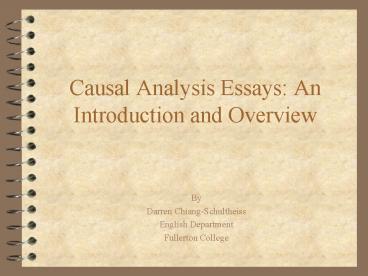Causal Analysis Essays: An Introduction and Overview - PowerPoint PPT Presentation
1 / 18
Title:
Causal Analysis Essays: An Introduction and Overview
Description:
Drunk driving and speeding are the two biggest reasons for accidents and deaths on the highway. ... the individual causes of the effect or effects are linked to ... – PowerPoint PPT presentation
Number of Views:610
Avg rating:3.0/5.0
Title: Causal Analysis Essays: An Introduction and Overview
1
Causal Analysis Essays An Introduction and
Overview
- By
- Darren Chiang-Schultheiss
- English Department
- Fullerton College
2
Process Analysis Vs.Causal Analysis
- Process focuses on describing the sequence of
events - Cause-and-effect writing focuses on why one event
causes another to occur. - It is concerned mainly about relationships among
actions and events
3
Causation can be expressed in several ways
- why the Civil War was fought
- the reasons your friend Nga joined the Army
- your motivation for going to college
- what brought about changes in the law
- what makes a person commit a crime
- what produces nuclear fusion
- what gives rise to the parking problem at FC
4
- Causal analysis is used to describe/explain why a
person, event, or situation brings about a
certain result.
5
Effect can be described in various ways as well
- Outcome of a lawsuit
- consequences of waiting too long to study for a
test - results of expanding commercial air traffic
- a development arising from new environmental
concerns - the product created by the process of clear
thinking
6
Types of Causes
- An immediate cause takes place just before a
result emerges and is directly responsible - A remote cause is further removed from the effect
it generates and may have a more profound
importance than do immediate causes
7
Example
8
Types of Effects
- An immediate effect follows directly after an
event. - e.g. the car halts after running out of gas
- A remote effect occurs long after its cause and
any immediate effects. - e.g. the final grade may be lower than expected
- Effects differ in their nature and seriousness
9
Patterns of Cause and Effect
10
A single cause with a single effect
- The heavy traffic made me late to work.
- The earthquake cracked the plaster on my wall.
11
A single cause with multiple effects
- The storm damaged crops, flooded roads, and
causes schools to be closed. - Exercise strengthens the heart, reduces blood
pressure and stress, and helps you lose weight.
12
Multiple causes with a single effect
- Pruning and feeding roses regularly will produce
more blooms. - High blood pressure, stress, obesity, and the
lack of exercise all contribute to heart disease.
13
Multiple causes with multiple effects
- Drunk driving and speeding are the two biggest
reasons for accidents and deaths on the highway. - An unstable economy, lack of food and clothing,
and a complete mistrust of the government led to
riots in the capital and strikes in all the
factories.
14
- Notice that all of the previous statements of
cause-and-effect patterns also could be used as
the thesis statement of an essay. - Use these as examples of how to write a thesis
statement in your own essay you need to give a
clear map of the major points you intend to
discuss and analyze in your essay.
15
Causal Chain
- In a causal chain, the individual causes of the
effect or effects are linked to each other. The
causal chain may be circular in its pattern. - Take a look at this example paragraph...
16
A Causal Chain
Once Mike got promoted to production manager, his
ambition increased. He went back to college for
a masters degree to get a job with Smith
Taylor, a large manufacturing firm. His
experience there gave him the expertise to start
his own company three years ago, and he used the
profits from that company to start two additional
manufacturing plants and a retail store in
Chicago.
17
Avoid illogical reasoning
- Post hoc ergo propter hoc
- (Latin for after this, therefore, because of
this) - Just because it rained Thursday and you got fired
Thursday doesnt mean the rain caused you to get
fired. - Associated condition
- Beware of mistaking an associated condition with
either a cause or an effect in a given situation.
You have to demonstrate the cause-and-effect
relationship between events before claiming one
caused or resulted from the other.
18
Order Causes and Effects Effectively
- Discuss causes and their effects in the order
that makes them clearest for your reader. - Begin with the known and work to the less known.
- Treat content chronologically.
- Discuss content by arranging causes or effects
according to increasing order of importance (or
decreasing order of importance, if you like)































